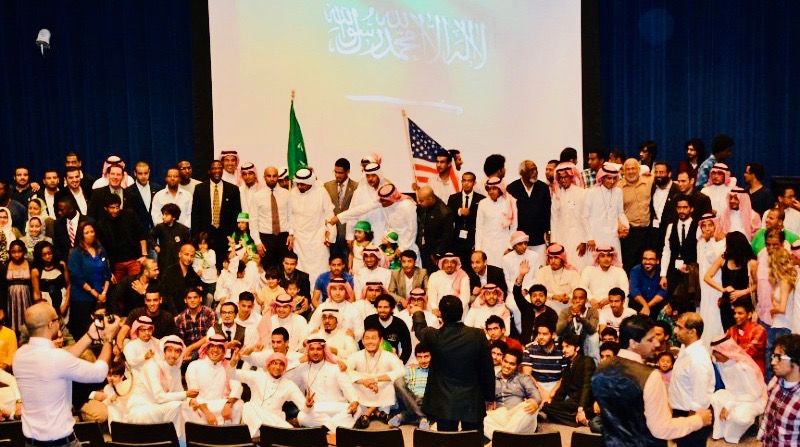NASHVILLE, Tenn. (TSU News Service) – Eman Abdulrahman Alharbi spent only three years at Tennessee State University, but she is leaving with a bit of proud history, as the first student from Saudi Arabia to earn a doctorate at TSU.

Her history-making feat, though, may be short-lived if the current influx of students from her country is any indication. She is part of a growing number of international students from Saudi Arabia that call TSU home. Records show more than 70 percent of the nearly 570 foreign students at TSU are from Saudi Arabia.
This is a good thing, university officials say.
“Ninety-nine percent of these Saudi students come here fully funded by their government as Saudi Arabian Cultural Mission scholars,” says Mark Brinkley, director of International Education in the Office of International Affairs.
Studies show the surge of Saudi students is not unique to TSU.
Nationally, Saudi Arabia ranks fourth with 4.9 percent of total 1.08 million international students in the U.S., only behind China, South Korea and India.

An annual report by the Institute of International Education and the State Department shows that the number of international students in the United States increased by 3.4 percent over the prior year. The rise marks the 11th consecutive year of expansion in the number of foreign students in the U.S. This is also a dramatic jump from the fewer than 600,000 who studied here just a decade ago, according to the report.
Experts attribute this rise to expanded higher education opportunities. At TSU, Brinkley says the university is offering what the students want and providing an environment that makes them want to stay, and that makes others want to come.
The biggest draw, he says, is the university’s highly accredited engineering program.

“They select TSU because we have been able to offer the majors that they want to enter, particularly in the field of engineering,” says Brinkley. “Well over half of our engineering majors are SACM students.”
Dr. S. Keith Hargrove, dean of the TSU College of Engineering, is not surprised by the influx of foreign students in his program. He says in addition to quality, the TSU program is designed around providing students an environment that appreciates differences in culture, race, origin and background.
““Our goal in the College of Engineering is to produce what we call the ‘global engineer,’ says Hargrove. “This is a graduate who is prepared to demonstrate technical competency to work anywhere in the world. This objective has been supported by our study-abroad program and the invitation to international students to complete their engineering degree at TSU.”

For Alharbi, who earned an Ed.D. in Educational Leadership at last fall’s graduation, the TSU culture of diversity and inclusion was the welcoming factor.
“My advisor at MTSU (Middle Tennessee State University) where I received my master’s degree, recommended me to Tennessee State University, and I am glad I came,” says Alharbi. “The people made me feel at home. TSU has great professors, who never gave up on me even though there was a language barrier.”
Alharbi is not alone. Even though these international students come very determined to succeed, the language barrier can be a major stumbling block for many – not just Saudis. This is another area where TSU stands out – helping students navigate the language difficulty and succeed.

Dr. Trinetia Respress is the interim assistant dean in the College of Education, who also mentored and advised Alharbi. She says professors must “actually be ready to go beyond and give extra support” to help these international students overcome the language barrier.
“As a person, I saw Eman to be a very tenacious and determined person who wasn’t going to allow anything to turn her around,” says Respress. “It is that she actually wanted it and she went after it. She is a very good student and very bright.”
Alharbi earned her doctorate in three years at TSU. Her interest is in higher education accreditation with a goal to help more Saudi universities gain international accreditation. And Her dissertation, “Preparing Saudi Universities for International Accreditation in the Area of Government and Leadership,” reflects that desire.
“My plan is to work with Saudi universities in evaluating outcomes and assessing the weaknesses and strengths in helping them get international accreditation,” says Alharbi. “I want to work with accrediting agencies and to bridge the disconnect between universities in the United States and my country in the area of accreditation.”
According to Brinkley, Alharbi represents the kind of “international ambassadors” that TSU cultivates.
“In most instances, our surge is the result of word-of-mouth referrals about the culture here at TSU being supportive,” says Brinkley. “That’s what draws them here. They find our programs to be academically and culturally supportive by offering the majors they are looking for and an environment suited to their needs.”
Department of Media Relations
Tennessee State University
3500 John Merritt Boulevard
Nashville, Tennessee 37209
615.963.5331
About Tennessee State University
With more than 8,000 students, Tennessee State University is Nashville’s only public university, and is a comprehensive, urban, co-educational, land-grant university offering 38 bachelor’s degree programs, 25 master’s degree programs and seven doctoral degrees. TSU has earned a top 20 ranking for Historically Black Colleges and Universities according to U.S. News and World Report, and rated as one of the top universities in the country by Washington Monthly for social mobility, research and community service. Founded in 1912, Tennessee State University celebrated 100 years in Nashville during 2012. Visit the University online at tnstate.edu.


